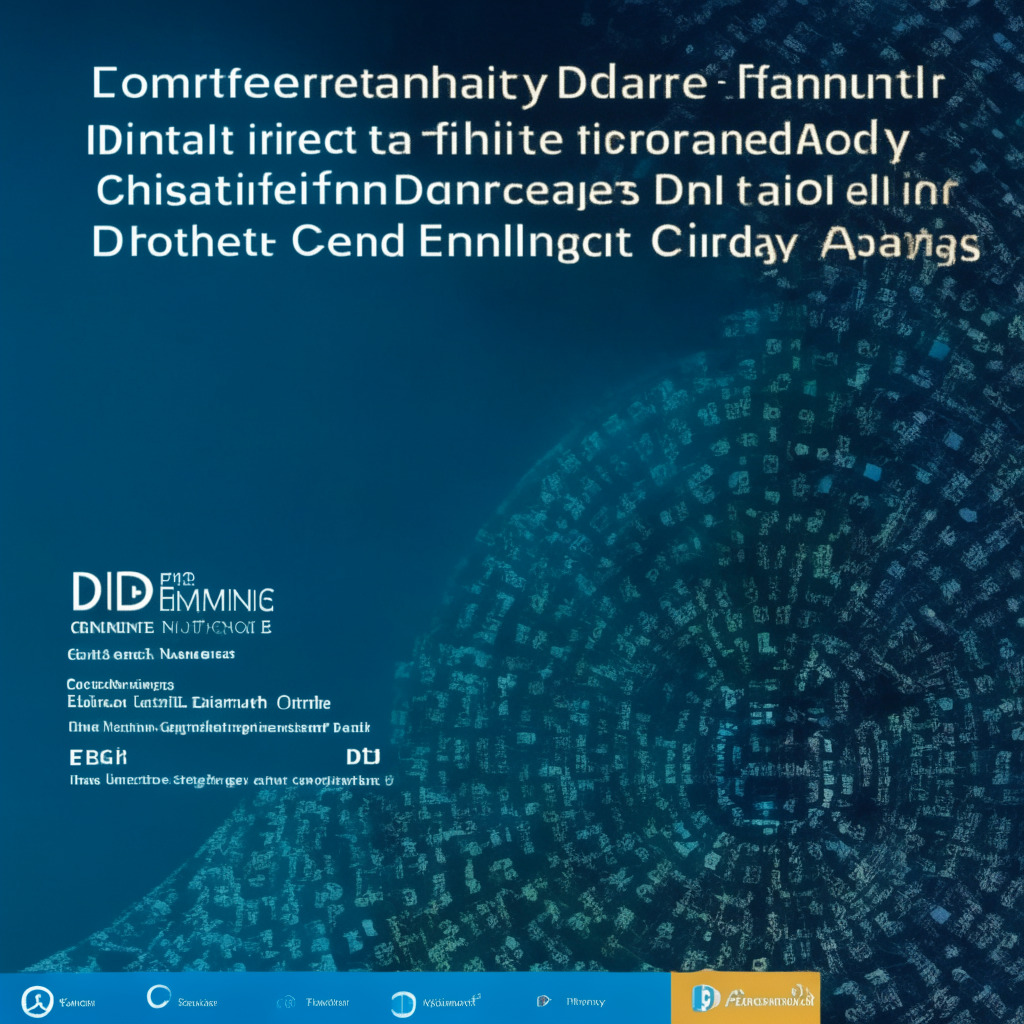The “Payments Regulation and the Systemic Perimeter” framework introduced by the Bank of England specifies regulations for systemic stablecoins. The framework outlines collaboration among multiple regulatory bodies, with the Bank of England holding veto power over potential actions against important institutions. The goal is to enable safe adoption of crypto and establish a well-regulated future for systemic stablecoins.
Search Results for: Bank of England
Navigating the Crypto Sea: Bank of England’s Shift with Sarah Breeden’s Era
Sarah Breeden, a part of the BoE’s Central Bank Digital Currency task force, will become the Deputy Governor of the Bank of England from Nov. 1, 2023. Her leadership may have significant implications for Britain’s cryptocurrency landscape. Her role in determining the potential prospects and risks of digital currencies holds major interest for cryptocurrency enthusiasts.
Bank of England Governor’s Stance on Crypto: An Unsettling Future or Undeniable Potential?
“Governor Andrew Bailey of the Bank of England expressed skepticism towards cryptocurrencies, particularly Bitcoin, citing their volatile nature. However, he sees potential in enhanced forms of digital money. Despite concerns over the stability of stablecoins, the bank is exploring options for modernizing through the potential introduction of retail Central Bank Digital Currency payments.”
Unpacking the Bank of England’s Take on ‘Enhanced Digital Money’ over Cryptocurrencies
Governor of the Bank of England, Andrew Bailey raised concerns about the instability and insecurity of cryptocurrencies and stablecoins, advocating for ‘enhanced digital money.’ This form of money transforms digital funds into units that can execute actions in smart contracts. Bailey believes that this could offer better safety and singleness compared to current digital currencies. However, its ability to prevent security breaches remains a question.
Bank of England’s Rate Hike Impact on Bitcoin and Ethereum: Navigating Volatility
Bitcoin and Ethereum prices witnessed retracements after the Bank of England’s unexpected 50 basis points interest rate hike, aimed at combating 8.7% inflation. Analysts predict possible consolidations in the crypto market, while traders remain optimistic about Bitcoin reaching $35,000, supported by whale accumulation.
Bank of England Inches Towards CBDC: Exploring Pros, Cons, and Privacy Concerns of Britcoin
The Bank of England and the BIS completed a yearlong project, Rosalind, exploring the practicality and potential benefits of a Central Bank Digital Currency (CBDC). Findings suggest CBDCs could expedite person-to-person payments, enable innovative financial products, and reduce fraud, paving the way for the Digital Pound, informally known as “Britcoin.”
Balancing Skepticism and Hope: Insights on the Crypto World from a Central Banker
“Sarah Breeden, the incoming deputy governor of the Bank of England, voices concern over potential financial instability posed by cryptocurrencies. While acknowledging the benefits of blockchain technology, she emphasizes the need for a global regulatory approach to manage cryptos’ volatility and potential economic implications. She sees value in a central bank digital currency as an anchor, while warning against potential privacy issues.”
The Intriguing Prologue of Central Bank Digital Currencies: Boon or Bane?
Central banks worldwide are exploring Central Bank Digital Currencies (CBDCs): digital versions of their currency eliminating intermediaries. This development claims cost-saving potential and policy-making tools but carries risks. Without private banking, government surveillance increases, the market economy may stagnate, and individual protections decrease. Politically-motivated fund allocation also becomes possible. Therefore, while CBDCs may appear attractive, comprehensive discussions around the dangers and ethical use are needed.
Predicting an Era of Central Bank Digital Currencies: Future Boon or Crypto Bale?
“Switzerland-based BIS predicts the issuance of as many as 15 retail Central Bank Digital Currencies (CBDCs) by decade’s end, with 93% of Central Banks globally involved in CBDC research, planning and piloting. The trend towards CBDCs might bridge the financial gap among the unbanked worldwide, but raises questions about traditional cryptocurrencies’ value as CBDCs would be government-controlled.”
15 Central Bank Digital Currencies by End of Decade: A New Era of Finance or Privacy Threat?
By the end of this decade, around 15 retail central bank digital currencies (CBDCs) could be globally available, covering nearly 95% of the world economy according to BIS. This emerging technology can offer significant benefits, but also brings challenges like privacy concerns.
Retail CBDCs: Exploring Benefits, Challenges, and the Future of Central Bank Digital Currencies
The Bank for International Settlements (BIS) published a paper on retail central bank digital currencies (CBDCs) as central banks worldwide explore their potential. Retail CBDCs, designed for public use, could support monetary and financial stability but also face concerns including political interference, financial instability, and data privacy.
Bank Collapses Threaten Crypto: Pros and Cons of Direct Central Bank Access for EMT Issuers
This article discusses the risks associated with bank failures and the crypto market, highlighting the dependency of stablecoin issuers on banking partners for fiat settlement. It suggests granting e-money institutions direct access to central bank accounts, like in the UK and Lithuania, to increase safety, foster payment innovation, and reduce banking risks.
Exploring Privacy and Fraud Prevention in Central Bank Digital Currencies (CBDCs)
Central Bank Digital Currencies (CBDCs) are gaining traction as a promising solution for financial institutions worldwide. Quant, a UK-based company, is working on CBDC development, focusing on privacy while upholding Anti-Money Laundering (AML) and Know Your Customer (KYC) measures. Collaborating with the Bank of England, the potential digital pound aims to address fraud and financial crime effectively while balancing privacy concerns.
Blockchain Revolution: The Dual Stance of BOE’s New Deputy on Crypto Stability and Risk
Sarah Breeden, the incoming deputy governor of financial stability at the Bank of England, believes that cryptocurrencies are currently not a significant threat to financial stability. Though highlighting risks linked with digital assets, she underlines the potential of crypto technology in bolstering financial systems.
Navigating the Waters of a Digital Pound: The UK’s Leap into CBDC’s Future
“The Bank of England is advancing in the world of cryptocurrencies, establishing a new Central Bank Digital Currency (CBDC) Academic Advisory Group. Tasked with facilitating interdisciplinary discussions on a potential digital pound, this group is aimed at managing a multifaceted assembly of expertise, spanning from monetary policy to law, marketing and more. Their success could pave the way for a sustainable and successful digital pound in the future.”
Stablecoins in the UK: Balance between Consumer Protection and Systemic Stability
“The future of UK’s stablecoins appears secure following the Bank of England’s intent to establish a systemic stablecoin regime, jointly overseen by the BoE and the Financial Conduct Authority. Recent developments include an extended accountability framework and considerations towards insolvency cases. However, concerns surround potentially favouring the return of customer funds over service continuity.”
Navigating the Thin Line: Nuggets, BoE and the Privacy Debate in the Digital Pound Era
UK-based payments platform, Nuggets, collaborates with the Bank of England to create a privacy and identity layer for a potential digital pound. Nuggets aims for a system free from transactional tracking, with zero-knowledge proofs to validate identities without data exposure, balancing user privacy and regulatory oversight.
Exploring the Digital Pound: Ledger Technologies, Privacy, and Public-Private Collaboration
The Bank of England is progressing with its Central Bank Digital Currency initiative, exploring multiple ledger technologies including blockchain for the digital pound. The privacy-focused design prioritizes user privacy and involves collaboration between public and private sectors, highlighting the importance of evolving financial landscape and global shift towards digital currencies.
Britcoin on the Horizon: Pros, Cons & Privacy Concerns of CBDCs Unraveled
The Bank of England advances towards launching “Britcoin,” a central bank digital currency (CBDC), following the positive findings in Project Rosalind. The experiment explored API implementation for efficient retail CBDC transactions, while addressing skepticism surrounding CBDC programmability and user privacy concerns. The final decision on a CBDC is still years away.
Digital Pound: Navigating New Legislation, Privacy, and AML Regulations for CBDC Adoption
The introduction of a digital pound in the U.K. requires new legislation defining its characteristics and amendments to current data, privacy, and anti-money laundering regulations. The Treasury and Bank of England are currently seeking public feedback on its design while developing its policy and technology aspects. The legal framework should address ownership, security, and ensure privacy while protecting citizens from fraud.
Revolut’s License Woes & ASX Ditches Blockchain: Debating Innovation vs Stability
The Bank of England may reject Revolut’s banking license due to balance sheet concerns, while ASX Ltd opts for a conventional technology for its software overhaul instead of blockchain. HashKey Group plans to raise funds at a $1 billion valuation, and Grayscale exploits a potential loophole with a new Bitcoin ETF filing. Ledger’s controversial service launch is deemed a PR failure, and Bit Digital moves operations to Iceland for regulatory risk mitigation. Researchers suggest CBDC systems can be used for cross-border payments, and Switzerland’s canton of Zug raises the limit for tax payments in BTC and ETH.
Debating Anonymity in Digital Pounds: CBDCs vs Cryptocurrencies in the UK
At a recent Financial Times Cryptocurrency and Digital Assets Summit, Tom Mutton, the Bank of England’s head of fintech, discussed the UK’s plans for a central bank digital currency (CBDC) focusing on privacy and anonymity. While emphasizing privacy, Mutton stated that anonymity would not be intended for the digital pound and it would not be interoperable with cryptocurrencies. The Bank of England’s approach raises questions on the role of anonymity, privacy, and interoperability in the financial ecosystem.
Pivotal Move: How the UK’s Regulatory Changes Could Shape the Global Crypto Landscape
“The United Kingdom could potentially leapfrog the US in Web3 crypto environments, contingent on an unconventional regulatory trajectory. Changes like curbing liabilities for DAO token holders and amending FCA’s KYC guidelines could catalyze growth in emerging technologies. Nonetheless, the crypto evolution is challenged by potential misuse and regulatory hurdles.”
Sky-High Interest Rates: An Unavoidable Future in Cryptocurrency Markets
“Sky-high interest rates are becoming a necessity in the cryptocurrency market as reliance on central banks erodes. The rising forecast for the Federal Funds Rate signifies a lasting high interest rate scenario, significantly impacting crypto markets. Therefore, focus must shift towards thorough assessment of the crypto ecosystem and its offerings.”
Political Pressure Meets Blockchain: The Shifting Sands of UK’s Crypto Regulatory Landscape
“Former FCA chairman Charles Randell discusses alleged political influence on UK regulatory bodies to adopt cryptocurrency companies. While some see these pressures as compromising, they may catalyze the safe adoption of emerging technologies like cryptocurrency within custom-built frameworks for the digital asset sector.”
Navigating Blockchain: Innovations, Challenges, and the Intriguing Future of Cryptocurrency
“A telling report by Glassnode indicates that long-term crypto holders are showing tenacity, with Coinbase and Binance creating waves in the sector. Coinbase launched its Ethereum layer-2 blockchain, whereas Binance became the first fully licensed crypto exchange in El Salvador.”
Regulatory Highwire: UK’s Crypto Future Amidst FCA’s Proposed Promotions Ban
CryptoUK voices concern over the UK’s Financial Conduct Authority’s proposal to ban crypto incentives like NFTs and airdrops. Fearing this might push firms to relocate, they urge consideration of potential ‘unintended consequences.’ CryptoUK also seeks further clarity in FCA’s existing guidance on crypto advertisement regulations.
Cryptocurrency Developments: Binance Licenses, Coinbase Buybacks, and More Unraveled
“Binance receives licenses from Central Reserve Bank and National Commission of Digital Assets in El Salvador fostering financial inclusion. Coinbase proposes buying back $150m of its bonds eliciting mixed investor sentiment. Bitstamp seeks to expand operations, reminding of crypto investment risks.”
XRP’s Decline Reflects Crypto Market Instability Amid Legal Disputes and New Partnerships
“XRP price dropped by 3.4% in a quiet crypto market, hinging on Ripple’s legal tussle with the SEC and fluctuating technical indicators. Despite potential losses, partnerships and stablecoin trials give XRP recovery chances. Ethereum-based XRP20, offering income opportunities, might engage XRP-awaiting traders.”
Digital Pound Dilemma: Treading the Path Between Financial Innovation and Privacy Concerns
“The UK’s proposal for a Central Bank Digital Currency (CBDC), the ‘Britcoin’, met with public criticism due to privacy and stability concerns. Critics also suggest the CBDC could destabilise commercial banks during a crisis. Conversely, some see state-issued digital currencies as a path to financial inclusion, and argue that privacy can be maintained through appropriate design and regulations.”
BIS Strategy for Securing Digital Currencies: A Robust Framework or a Step Towards Centralization?
The Bank for International Settlements (BIS) has released a strategy to protect central bank digital currencies (CBDCs) from cyber threats. The security framework aims to ensure confidentiality, integrity, and availability for CBDC transactions, considering potential security risks prevalent in decentralized finance (DeFi). However, the implementation of such a security model could require significant resources and may lead to debates over centralization in a decentralization-based ecosystem.
Week in Review: FTX Splash, Binance Moves & Global Crypto Legal Twists
“This week in crypto was marked by major exchange operations, regulatory challenges, and shifts in nations’ attitudes towards digital assets. Developments included FTX’s plans to reopen, Binance’s regulatory issues, MicroStrategy’s portfolio growth, potential CBDC launches, and varied legal positions on crypto worldwide. These events highlight the rapidly evolving crypto landscape.”































